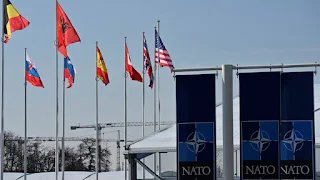NATO countries confirmed that they do not intend to send any ground forces to Ukraine, to prevent any new tension with Russia.
NATO countries have ruled out sending ground forces to Ukraine, fearing that this type of move would lead to a conflict between the alliance and Russia.
Germany, Britain, Spain, Poland and the Czech Republic abstained from agreeing to any proposal that would require them to send ground forces to Ukraine.
In this context, German Chancellor Olaf Scholz said on Tuesday: “Neither European countries nor NATO countries will send ground forces to Ukraine.”
Later, the White House also confirmed that it did not intend to send ground forces, but urged US lawmakers to approve a stalled bill to provide security assistance that would ensure that Ukrainian forces obtain the weapons and ammunition needed to continue fighting.
Last Monday, French President Emmanuel Macron called on Western allies not to rule out any options as they seek to avoid a Russian victory in Ukraine.
This came during a hastily held meeting of European leaders in Paris to discuss ways to strengthen the currently weak support for Kiev.
In an explanation of Macron's statements, French Foreign Minister Stephane Seghorn said, "The president was considering sending troops to carry out specific tasks such as helping to clear mines, weapons production, and cyber defense."
Sigorn pointed out that this "may require a (military) presence on Ukrainian territory, without reaching the point of fighting."
Macron's statements angered Moscow, as Kremlin spokesman Dmitry Peskov said on Tuesday: "This is not in the interest of these countries (NATO countries) at all. They must realize that."
Peskov considered that merely raising this possibility constitutes a “very important new element” in the conflict.
In response to a question about the risks of a direct conflict between Russia and the North Atlantic Treaty Organization (NATO) if members of the alliance send forces to fight in Ukraine, he said: “In this case, we will not need to talk about the possibility, but rather about the inevitability of direct conflict.”
Centcom announces the downing of 5 drones and the German Navy targets the Houthis for the first time
In what is considered the first use of live weapons, the German Navy announced the downing of two drones belonging to the Yemeni Houthi group, as part of its participation in the European Union mission to protect navigation in the Red Sea, while the Centcom coalition announced the downing of 5 other drones.
The German Navy announced that it shot down two drones that it said belonged to the Yemeni Houthi group, for the first time as part of its participation in the military mission launched by the European Union to protect the security of navigation in the Red Sea.
The German News Agency reported on Wednesday that the Hessen frigate shot down two Houthi drones yesterday evening, Tuesday, noting that this operation was the first use of live weapons by the German Navy.
She pointed out that the road that passes through the Red Sea and the Suez Canal is “one of the most important global trade routes.”
Earlier this February, the European Union launched a naval mission called "ASPEDS" to protect commercial ships in the Red Sea from attacks by the Yemeni Houthi group.
The Union explained in a statement at the time that the operations include the Straits of Bab al-Mandab and Hormuz, and the international waters of the Red Sea, the Gulf of Aden, the Arabian Sea, the Gulf of Oman, and the Arabian Gulf.
In the same context, American aircraft and warships shot down 5 Houthi attack drones in the Red Sea, yesterday evening, Tuesday, according to what the US Central Command (Centcom) announced.
Centcom said in a statement on Wednesday: “On Tuesday evening, Sanaa time, American aircraft and a coalition warship shot down 5 Iranian-backed drones belonging to the Houthis in the Red Sea.”
It indicated that it had identified these drones coming from areas controlled by the "Houthis" in Yemen, and decided that they represented an imminent threat to American commercial and naval ships and coalition ships in the region.
On Tuesday evening, Al-Masirah TV, the Houthi mouthpiece, reported urgent news stating that the United States and Britain had carried out two air strikes on the island of Labwan in the coastal province of Hodeidah, western Yemen, without clarifying the objectives and results of the targeting.
Last December 18, US Secretary of Defense Lloyd Austin announced the formation of an international coalition called “Guardian of Prosperity,” with the aim of “ensuring freedom of navigation for all countries and enhancing regional security and prosperity.”
The coalition includes 10 countries: the United States, the United Kingdom, Canada, France, Italy, the Netherlands, Norway, Seychelles, Spain, and Bahrain.
In "solidarity with the Gaza Strip", which is facing a devastating Israeli war with American support, the Houthis target, with missiles and drones, Israeli cargo ships or those linked to them in the Red Sea, determined to continue their operations until the end of the war on the Strip.
With the intervention of Washington and London and the tension taking a noticeable escalation trend last January, Al-Houthi announced that it now considered all American and British ships among its military targets.


Informative
ReplyDelete